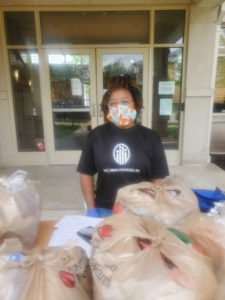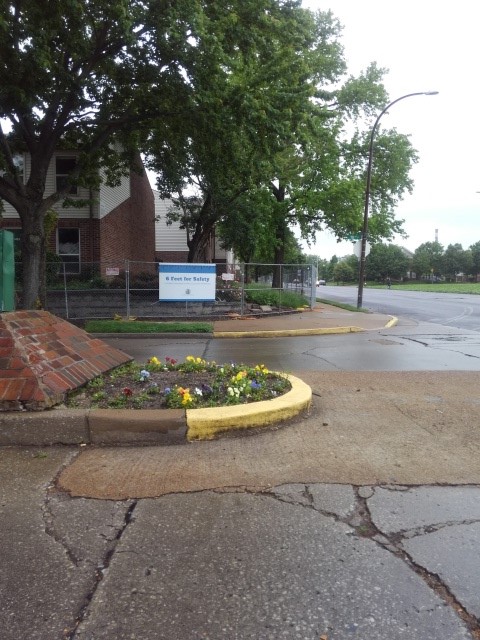Understand how USI is continuing to serve families throughout the COVID-19 crisis.
As the COVID-19 pandemic unfolded, USI launched our COVID-19 Action Plan to ensure that residents in our communities would continue to receive the support they need to be stable and thriving. This multi-pronged strategy focused on contacting all residents to understand the immediate needs faced by families due to this crisis. Through this outreach, USI gathered intensive data on food insecurity, employment, access to technology, existing health risks, and more.
Still, we know that strong data matters most when it is shared broadly and enables aligned actions with community partners. As such, we prioritized convening existing and new local partners to share this data, hear about their experience during the coronavirus pandemic, and better align our responses in service to families and children.
Strengthening Partnerships in a Time of Crisis
Over the course of 2 months, USI staff in 17 of our cities across the country met with a total of 248 partner organizations. We connected with representatives of local public housing agencies, workforce development organizations, schools, faith communities, health practitioners, and more. Some of these partners we have known for years and others we have yet to meet in person. Regardless of who attended, these partner meetings underlined the necessity of collaboration in this time and in all times, for the health and well-being of both staff and the residents we work with every day.
While these meetings enabled us to better respond on the local level, USI’s national scope gives us the ability to see national trends in the field. In these meetings, we heard a pattern in some of the shifts made by our partners in response to COVID-19, some of the challenges they have encountered, and what opportunities we have moving forward to build on some of the innovative solutions created during this crisis moment. The following paragraphs share our collective experiences.
Shifting to Virtual
A majority of our partners quickly transitioned their services to virtual settings. This shift means an increase in telehealth meetings with doctors and mental health therapists, or virtual meetings with job counselors or tax preparers. With this change comes challenges and opportunities for innovation.
Not only has digitizing connections made it more challenging to connect in an empathetic way with clients, but it has also created barriers to connect to those in our communities who lack internet access and other vital technology. While it is unclear how long engagement will remain virtual, community organizations have created some innovative solutions to support community needs for technology and internet access.
In San Antonio, TX, where 32% of residents we surveyed do not have internet access, our partners at Spurs Give opened the otherwise unused Wi-Fi capabilities of the AT&T Center parking lot to provide free internet access to residents who needed it for school, work, or staying connected to community.

Community Services Liaison Briana Bryant distributing essential supplies to families in St. Louis
Focusing on Basic Needs First
Many of our partners also mentioned that on top of shifting to virtual service delivery they have prioritized connecting families with daily essentials and mental health support services. For example, the Compassion Center in Baltimore, MD, went from interacting with community members daily through providing basic needs like diapers and clothing to moving most of their services virtual and increasing their socially distant food donation and resource delivery capacity.
Other organizations expedited their processes for receiving aid, removing some barriers so that families can get what they need sooner. An inspiring number of organizations like Teens with a Purpose in Norfolk, VA, increased their hours of operation to best meet the needs of families and youth whose schedules have also shifted. Across the country, we also saw multiple organizations developing grief circles and other mental health supports to provide opportunities for healing during this difficult time.
Staff Trauma
Our partners have made tremendous shifts to meet the changing needs of families in this evolving environment. However, they are also encountering their own challenges due to this pandemic. Not only has this pandemic increased the stress of some of the families we serve, but it also has induced trauma and stress in the staff working to support families.

USI Regional VP Kristie Stutler facilitating Soul Food, a virtual wellness session.
Many of our partners are led by black, indigenous, people of color (BIPOC) and have expressed the increased burden of professional and personal stress during this pandemic which has disproportionately damaged BIPOC communities. In response, organizations have implemented strict health protocols to help mitigate risk and fear and provided staff with resilience trainings and trauma workshops to process and manage the added stress of this moment.
USI has also supported this work by providing system-wide mindfulness virtual sessions appropriately named, Soul Food, to aid in the selfcare of frontline staff and program partners. These sessions allow a safe space for staff and partners to practice stretching and breathing exercises, share emotions through curated discussions, and journaling activities to help manage stress. The USI system also provided COVID-19 specific sick and personal days, along with an intentional connections to the company-wide, Employee Assistance Program (EAP) options available to staff and their families.
Funding Uncertainty
Adding to this emotional stress of nonprofit staff is the fear of a drying up of funding resources in the coming months. Many of our foundation partners have quickly distributed emergency relief funds and provided flexibility on existing grants. Still, other community organizations have identified the need for more relief funding for rent and utilities assistance for families.
Furthermore, with a dip in the economy, many nonprofits may have to close their doors due to a scarcity of resources. As such, the funding of general operating fund grants to organizations will play an important role in keeping open organizations that provide vital services to our communities. Despite these challenges and the feeling that many of our partners are being called to do more with less, this time has also presented opportunities.
Opportunities for More Sharing
These meetings provided a chance for partners to identify their needs and challenges and share some of their resources and knowledge. In our meeting in Minneapolis, MN, the George Family Foundation offered public housing authority officials leads on staffing resources for delivering meals to seniors living in their buildings. This spirit of sharing continued as partners in multiple cities discussed the opportunity to collaborate more on data collection, share data more regularly, and develop a single digital library of resources for families in each city.
In the spirit of collaboration and sharing, USI spearheaded a townhall for developers with HUD to offer community engagement best practices, to share how organizations are pivoting due to the pandemic, and how the HUD team can support grantees during these unprecedented times.
Rebuilding to Center Families
This pandemic has undoubtedly disrupted the lives of low-income families in our communities and the hundreds of organizations working to ensure these families can live stable and thriving lives. However, these shifts also allow for opportunities – opportunities to continue thinking innovatively, reducing barriers to resources, and collaborating more closely and more frequently.
Throughout this public health crisis our staff have shifted their time and attention to leading food drives, mask distribution, resource list sharing, and other unprecedented initiatives to meet needs and fill gaps in community support. To ensure that we remain aligned with the work of our partners, we regularly meet internally to ask effective questions about ensuring sound collaboration.
Only through aligned actions with hundreds of partners across the country will we usher families through this COVID-19 pandemic and continue to tackle the pandemic of racism that divests resources from and exploits our communities.
We all need each other in this work.
We are eager to share with you and interested partners across the country to ensure that the world we build after COVID-19 is not the same world we had before, but one that centers racial equity and prioritizes the health and prosperity of the families and children we work with every day.

A USI “6 Feet For Safety” sign hangs on the construction fence of Phase One of the Near North Side’s Preservation Square upcoming redevelopment.
About the Author: Caleb Rollins (he/him) is the Project Manager for the Mixed-Income Strategic Alliance at USI and based in Minneapolis, MN. Prior to his time in Minneapolis, Caleb supported the communications and development of national and local nonprofits in Washington, DC. Caleb holds a Bachelor’s Degree in International Service and Humanities from Valparaiso University.
